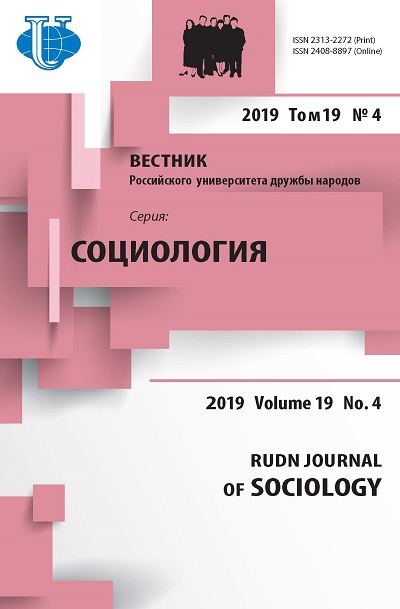Russian-speaking expats in the Middle East countries
- Authors: Akulich MM1
-
Affiliations:
- Tyumen State University
- Issue: Vol 19, No 4 (2019)
- Pages: 756-768
- Section: Surveys, experiments, case studies
- URL: https://journals.rudn.ru/sociology/article/view/22096
- DOI: https://doi.org/10.22363/2313-2272-2019-19-4-756-768
Cite item
Full Text
Abstract
The present scale of labor migration of highly qualified specialists determines the necessity to study the essence and consequences of this social phenomenon. The author offers the sociological interpretation of the concept ‘expat’ and explains its meaning in the empirical study of the adaptation of Russian-speaking expats in the Middle East countries. The relevance of the research in this region is determined, on the one hand, by the attractiveness of the Persian Gulf countries for professional and labor migration, and, on the other hand, by the lack of applied research aimed at considering the peculiarities of adaptation of Russian-speaking specialists and their families to the life in the Arab country. The data were gathered in the survey/interview of specialists and their family members ( n = 50/14) living in the countries of the Middle East. The results indicate that the expats migrate by their own will or by the invitation of the host party through the selection process in English. Expatriates and their families do not experience special difficulties in the adaptation to new living conditions, strive to maintain the traditions of their culture, and actively interact with representatives of the diaspora. In general, expats are satisfied with professional activities, self-realization, and living conditions. However, their family members practically do not work in their specialty though most of them got higher education. The expat family members are mainly employed in the service sector, and their children study in American and English schools and communicate regardless of nationality. Social-cultural adaptation of children is quite successful due to the available conditions - social (parks, playgrounds, beaches) and social-cultural (respectful and friendly attitude).
Keywords
About the authors
M M Akulich
Tyumen State University
Author for correspondence.
Email: m.m.akulich@utmn.ru
доктор социологических наук, профессор кафедры общей и экономической социологии
Semakova St., 10, Tyumen, Russia, 625003References
- Gerd A.S. Kto takie ekspaty? [Who are the expats?]. Russkaya rech. 2011; 4 (In Russ.).
- Korotky G.A. Kontseptsiya radikalnogo multikulturalizma [The concept of radical multiculturalism]. Vestnik MGOU. Seriya: Filosofskie Nauki. 2011; 3 (In Russ.).
- Mikhajlova A.S. Ekspaty na rynke truda megapolisa (analiz glubinnyh intervyu) [Expats on the megalopolis’ labor market (analysis of in-depth interviews)]. Migratsiya i Socialno-Ekonomicheskoe Razvitie. 2016; 3 (In Russ.).
- Searle J. Politika i gumanitarnoe obrazovanie [Politics and humanitarian education]. Otechestvennye Zapiski. 2002; 1 (In Russ.).
- Soldatova G.U., Shajgerova L.A., Shlyagina Е.I. Narusheniya etnicheskoj identifikatsii u russkih migrantov [Disturbances in the Russian migrants’ ethnic identification]. Sociologichesky Zhurnal. 1994; 3 (In Russ.).
- Chertina Z.S. Plavilny kotel? Paradigmy etnicheskogo razvitiya SShA [Melting pot? Paradigms of Ethnic Development of the USA]. Moscow; 2000 (In Russ.).
- Buber M. I and Thou. New York; 1970.
- Thomas W., Znaniecki F. The Polish Peasant in Europe and America. Vol. 1. New York; 1927.
- Expats in Middle East — statistics and trends. https://www.go-gulf.ae/blog/expats-middle-east.
- GCC: Total population and percentage of nationals and foreign nationals in GCC countries (national statistics: 2010—2016). https://gulfmigration.org/gcc-total-population-percentage-nationals-foreign-nationals-gcc-countries-national-statistics-2010-2016-numbers.
- Jain P.C., Oommen G.Z. South Asian migration to Gulf countries: History, policies, development. London; 2016.
- Leinonen J. Invisible immigrants, visible expats? Americans in Finnish discourses on immigration and internationalization. Nordic Journal of Migration Research. 2012; 2 (3).
- Mears P. UAE VAT tax 2018: The effects on expats in country. https://www.researchgate.net/ publication/310385594_UAE_VAT_TAX_2018_The_Effects_On_Expats_In_Country.
- McNulty Y., De Cieri H., Hutchings K. Do global firms measure expatriate return on investment? An empirical examination of measures, barriers and variables influencing global staffing practices. International Journal of Human Resource Management, 2009; 20 (6).
- Reis C., Yehuda B. Careers without Borders: Critical Perspectives. New York; 2013.
- Slak Valek N. The role of expats, local residents and tourists in defining a destination: A branding case study for Abu Dhabi tourism. International Journal of Sustainable Society. 2017; 9 (1).
- The 20 best countries around the world to live as an expat. https://www.businessinsider.com/ the-20-best-countries-for-expats-2014-10.
- Middle East: Saudi Arabia — World Factbook. https://www.cia.gov/library/publications/ resources/the-world-factbook/geos/sa.html.
- Middle East: Bahrain — World Factbook. https://www.cia.gov/library/publications/resources/ the-world-factbook/geos/ba.html.
- Middle East: United Arabic Emirates — World Factbook. https://www.cia.gov/library/ publications/resources/the-world-factbook/geos/ae.html.
- World Factbook Archive — Central Intelligence Agency. https://www.cia.gov/library/ publications/download.
- UNICEF Report on Migration Profiles in Saudi Arabia, 2013. https://esa.un.org/miggmgprofiles/ indicators/files/saudiarabia.pdf.
- Global Index of Religiosity and Atheism. Gallup, 2012. https://web.archive.org/web/ 20170729183609/http://www.wingia.com/web/files/news/14/file/14.pdf.














